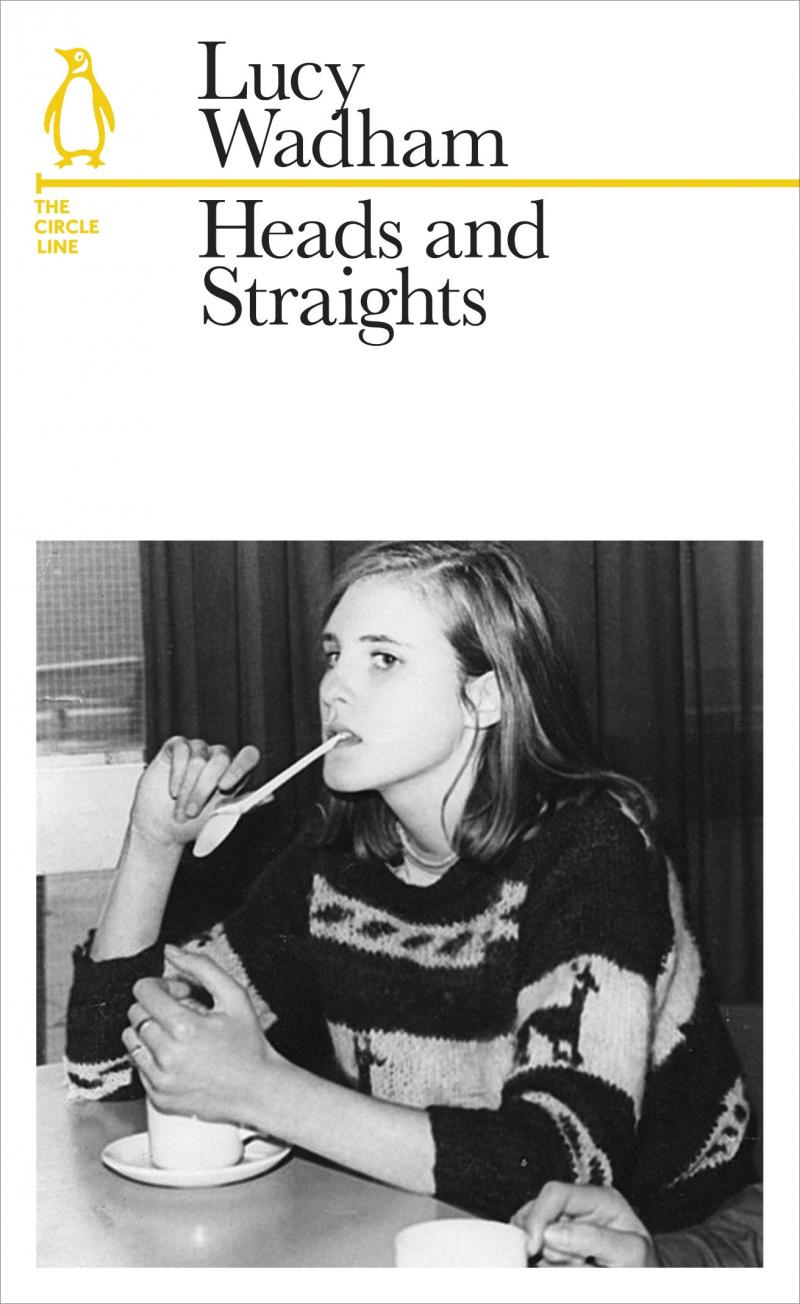Extract: Heads and Straights | reviews, news & interviews
Extract: Heads and Straights
Extract: Heads and Straights
As part of Penguin's celebration of London Underground's 150th anniversary, Lucy Wadham recalls growing up on the posh section of the Circle Line

The first time I admitted publicly to having been brought up in Chelsea I was 35 and at the launch party for my first novel, which was being held in a Tapas bar in Clapham. At that stage in my writing career I wasn’t aware that I was allowed guests of my own, so it was just myself, the sales team from my publishing house, a handful of book reps and some booksellers.
After supper we pushed back the tables and danced. It was easily the most fun I’ve had at a literary event. For much of the evening I talked to a woman called Luthfa, who worked for one of the book chains. She was Bengali and had been raised in East London. She had a deep laugh and an irreverent turn of mind and I found myself wanting her to like me. She told me about the book world that I was entering, how much she had loved it and how it was doomed. We shared our experiences of the Eighties and our feelings about Thatcher and her legacy and we discussed how much life in Britain had changed in the 13 years since I had left for France.
Punk Rock had set up its headquarters on the King’s Road, three minutes walk from our house
At last she asked me where I was brought up. Unsually I would stay vague about the borough of my youth or, when pressed, lie and say Putney, where I had lived briefly as a teenager, but this time I confessed. She teased me gently about being a Chelsea girl, as I knew she would and then gave me a brief lecture about the misguidedness of trying to conceal my background. Complexes like mine, she suggested, were reductive and led to a skewed and paltry view of life.
Soon afterwards I heard that Luthfa had left the book trade and we have not met since. Strange how a single encounter can so deeply affect your view of yourself. Had it not been for that conversation I doubt I would be attempting to write about my upbringing now. It was Luthfa who, in the wake of her own struggle to extricate herself from her background, had given me permission.
Inverted snobbery was embedded in my sisters and me from an early age so being from Chelsea was never a source of pride for any of us. I don’t know where this class shame came from, certainly not from our parents. Dad liked to pore over his family tree, claiming that his ancestors could be traced back to the Plantagenets, an assertion for which I have never found any proof whatsoever and Mum seems undisturbed by the fact that she often sounds like the queen. Nor did it come from our home counties, pink gin-quaffing grandparents, or even from our wild, bohemian grandmother, whose wildness, I’m sure, sprang in part from her sense of entitlement.
 Not all of us went as far to dissemble our background as my elder sister, Florence (Fly) did. By the time she had turned 16 she had changed her accent and adopted the "mockney" that would distinguish her from her four sisters who, in 1976 still sounded like Jenny Agutter from The Railway Children. By then it was easy for Fly to slip free of class boundaries. Punk Rock had set up its headquarters on the King’s Road, three minutes walk from our house and armed with her new voice and all the right gear she enrolled as a full time rebel, no questions asked. At night, after our parents had gone to bed, she would steal my Dad’s BMW 320 and cruise up and down the King’s Road in it, Mohawks protruding from the open roof. Today, when I ask her, she says she has no doubt that there were other posh girls in hiding with the gangs that haunted The Water Rat, The Roebuck and The Cadogan but at that time, where you came from didn’t matter half so much as whether or not you had balls.
Not all of us went as far to dissemble our background as my elder sister, Florence (Fly) did. By the time she had turned 16 she had changed her accent and adopted the "mockney" that would distinguish her from her four sisters who, in 1976 still sounded like Jenny Agutter from The Railway Children. By then it was easy for Fly to slip free of class boundaries. Punk Rock had set up its headquarters on the King’s Road, three minutes walk from our house and armed with her new voice and all the right gear she enrolled as a full time rebel, no questions asked. At night, after our parents had gone to bed, she would steal my Dad’s BMW 320 and cruise up and down the King’s Road in it, Mohawks protruding from the open roof. Today, when I ask her, she says she has no doubt that there were other posh girls in hiding with the gangs that haunted The Water Rat, The Roebuck and The Cadogan but at that time, where you came from didn’t matter half so much as whether or not you had balls.
Armed with the battle scars of the punk movement and a long fight with addiction, Fly eventually escaped to Australia and returned home years later to settle in Peckham. I, along with my two other big sisters, Izzy and Beatrice, ran away to France, where, as foreigners, we could elude the delineations of class. Indeed the only prejudice we encountered on arriving in Paris in the mid 1980s was the presumption that all English girls were easy lays, a presumption that, in our case, happened to be true.
- Heads and Staights by Lucy Wadham is published as part of the series Penguin Lines - Celebrate 150 Years of the London Underground which also includes books by John Lanchester (District Line), Kids Company (Victoria Line), Paul Morley (Northern Line) and John O'Farrell (Jubilee) among others. Each book costs £4.99
Explore topics
Share this article
The future of Arts Journalism
You can stop theartsdesk.com closing!
We urgently need financing to survive. Our fundraising drive has thus far raised £49,000 but we need to reach £100,000 or we will be forced to close. Please contribute here: https://gofund.me/c3f6033d
And if you can forward this information to anyone who might assist, we’d be grateful.

Subscribe to theartsdesk.com
Thank you for continuing to read our work on theartsdesk.com. For unlimited access to every article in its entirety, including our archive of more than 15,000 pieces, we're asking for £5 per month or £40 per year. We feel it's a very good deal, and hope you do too.
To take a subscription now simply click here.
And if you're looking for that extra gift for a friend or family member, why not treat them to a theartsdesk.com gift subscription?
more
 'We are bowled over!' Thank you for your messages of love and support
Much-appreciated words of commendation from readers and the cultural community
'We are bowled over!' Thank you for your messages of love and support
Much-appreciated words of commendation from readers and the cultural community
 The Narrow Road to the Deep North, BBC One review - love, death and hell on the Burma railway
Richard Flanagan's prize-winning novel becomes a gruelling TV series
The Narrow Road to the Deep North, BBC One review - love, death and hell on the Burma railway
Richard Flanagan's prize-winning novel becomes a gruelling TV series
 The Daughter of Time, Charing Cross Theatre review - unfocused version of novel that cleared Richard III
The writer did impressive research but shouldn't have fleshed out Josephine Tey’s story
The Daughter of Time, Charing Cross Theatre review - unfocused version of novel that cleared Richard III
The writer did impressive research but shouldn't have fleshed out Josephine Tey’s story
 BBC Proms: Kholodenko, BBCNOW, Otaka review - exhilarating Lutosławski, underwhelming Rachmaninov
Polish composers to the fore in veteran conductor’s farewell
BBC Proms: Kholodenko, BBCNOW, Otaka review - exhilarating Lutosławski, underwhelming Rachmaninov
Polish composers to the fore in veteran conductor’s farewell
 theartsdesk Q&A: actor Lars Eidinger on 'Dying' and loving the second half of life
The German star talks about playing the director's alter ego in a tormented family drama
theartsdesk Q&A: actor Lars Eidinger on 'Dying' and loving the second half of life
The German star talks about playing the director's alter ego in a tormented family drama
 Album: Cian Ducrot - Little Dreaming
Second album for the Irish singer aims for mega mainstream, ends up confused
Album: Cian Ducrot - Little Dreaming
Second album for the Irish singer aims for mega mainstream, ends up confused
 Evita, London Palladium review - even more thrilling the second time round
Andrew Lloyd Webber's best musical gets a brave, biting makeover for the modern age
Evita, London Palladium review - even more thrilling the second time round
Andrew Lloyd Webber's best musical gets a brave, biting makeover for the modern age
 Maiden Voyage, Southwark Playhouse review - new musical runs aground
Pleasant tunes well sung and a good story, but not a good show
Maiden Voyage, Southwark Playhouse review - new musical runs aground
Pleasant tunes well sung and a good story, but not a good show
 Album: Bonniesongs - Strangest Feeling
Intriguing blend of the abstract, folkiness, grunge and shoegazing from Sydney
Album: Bonniesongs - Strangest Feeling
Intriguing blend of the abstract, folkiness, grunge and shoegazing from Sydney
 theartsdesk at the Pärnu Music Festival 2025 - Arvo Pärt at 90 flanked by lightness and warmth
Paavo Järvi’s Estonian Festival Orchestra still casts its familiar spell
theartsdesk at the Pärnu Music Festival 2025 - Arvo Pärt at 90 flanked by lightness and warmth
Paavo Järvi’s Estonian Festival Orchestra still casts its familiar spell
 The Winter's Tale, RSC, Stratford review - problem play proves problematic
Strong women have the last laugh, but the play's bizarre structure overwhelms everything
The Winter's Tale, RSC, Stratford review - problem play proves problematic
Strong women have the last laugh, but the play's bizarre structure overwhelms everything
 Brixton Calling, Southwark Playhouse review - life-affirming entertainment, both then and now
Nostalgic, but the message is bang up to date
Brixton Calling, Southwark Playhouse review - life-affirming entertainment, both then and now
Nostalgic, but the message is bang up to date

Add comment